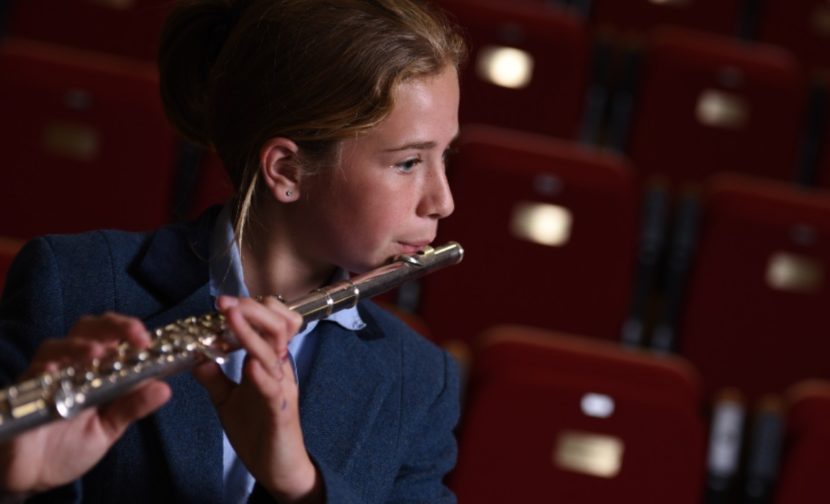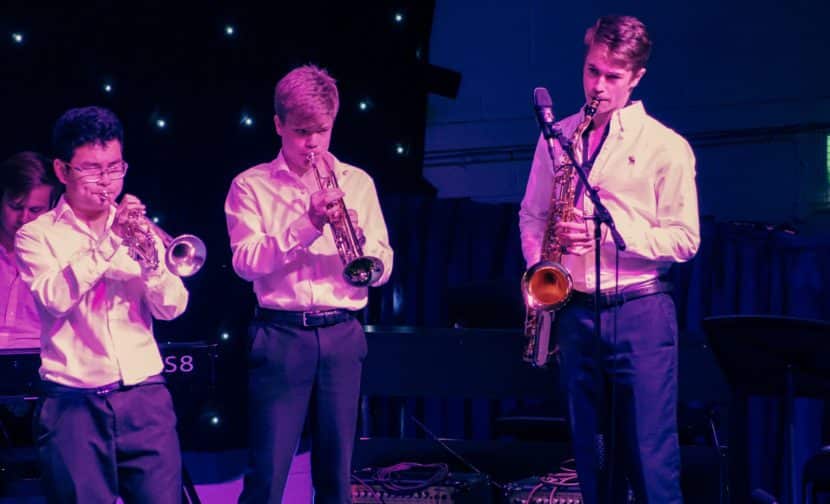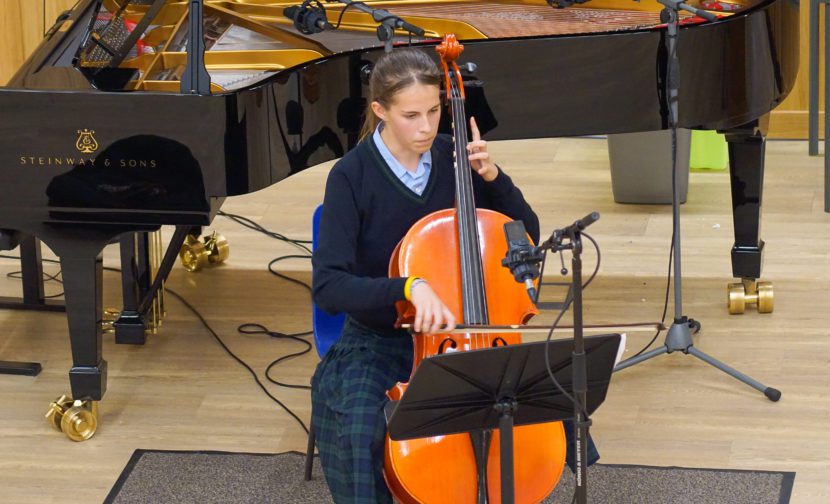Our aim as a department is to provide high quality musical opportunities for all pupils, regardless of standard, and to broaden and develop their experiences in a range of genres and styles, from the traditional to the contemporary.
The life and soul of a successful music department begins in the classroom and there are an exciting range of opportunities to study music at Gresham’s. Well-resourced classrooms and access to numerous practice rooms support pupils of all ages and musical preference to develop their skills and their music making. The Strathmore Studio is integral to all qualifications and students become literate using standard notation software and Digital Audio Workstation (DAW), to create and communicate their musical intentions.
Pupils who love music and study to develop their applied knowledge and academic understanding will thrive when pursuing their passion. The courses on offer enable pupils to forge their own way, explore further their own instrument, context and musical understanding
- YEAR 9
Year 9 focuses on engagement, enrichment and challenge, with a carefully scaffolded curriculum that develops key skills of performing, creating and musical literacy to provide a foundation in music making, being a new skill or developing and broadening existing musical experiences.
- GCSE MUSIC
Exam board: Edexcel GCSE (9-1)
GCSE Music is a fantastic way for pupils to further develop their love of music, using their existing practical skills to appreciate and understand a wide variety of musical styles, create their own music, and perform regularly, as a soloist and in groups.
Pupils are required to have experience of playing an instrument or singing – ideally to grade 4 standard – so that they can demonstrate an existing interest in music and musical understanding.
Grade 3 Music Theory knowledge is advantageous, and for those pupils aiming for top marks, Grade 5 Music Theory is strongly recommended. These courses are available to study throughout the duration of the course.
The GCSE qualification is split into three sections:
Performance – ‘Coursework’ 30%
Pupils will perform and record and submit two pieces of music, one as a soloist and another as part of a group. These pieces should be at a minimum of Grade 4, ideally grade 5 standard.Composition – ‘Coursework’ 30%
Pupils will create two pieces of music. One to an examination brief and another completely free choice. These can be in any genre or style and the use of music notation software or music technology is permitted.Listening & Appraising – Final written examination 40%
Pupils study eight set works, in detail, demonstrating their understanding of context, musical elements and the impact of the music. This also broadens out to many different genres and styles.Areas of study include:
• Western Classical Music – Bach & Beethoven
• Vocal Music – Purcell & Queen
• Music for Stage & Screen – Star Wars & Wicked: The Musical
• Fusion Music – Afro Celt Sound System & Esperanza Spalding
A final 1 hour 45 minute listening examination is held, with a variety of multiple choice and short answer questions linked to set works and unfamiliar music. Pupils also write an extended essay to compare and contrast a piece they have studied, with another which is new.Music GCSE offers academic rigor with the creative and expressive aspects you would expect from an arts GCSE.
- A LEVEL MUSIC
Entry requirements: Grade 6 in GCSE Music or equivalent and ideally at least Grade IV Theory Skills. Performing skills equivalent to Grade VI.
Music A level offers the academic pursuit of investigating and understanding music, creativity and the acknowledged achievement of pursuing a highly skilled activity and demonstrating your ability. It is an incredibly complimentary course for any range of subjects form the sciences and the arts. University options include studying Traditional or Popular Music at a University, performance at a Conservatoire, Music Technology, Musical Theatre and Performing Arts, as well as broader Media and Communications courses. Many universities offer choral and organ scholarships, and music can be a fantastic avenue into broadening your experience in Higher Education. Specific careers include performing, composing and arranging (following in the footsteps of alumni Benjamin Britten and Lennox Berkeley), teaching, arts administration, music publishing, music therapy and production in the music industry.
C1: Listening & Appraising You will study a wide range of pieces of music from across the world and from different time periods, developing listening and analysing skills. The Areas of Study cover the following areas:
- Western Classical Tradition – Solo Baroque Concerto, Operas of Mozart, Romantic Piano Music
- Popular Music – Soul, Funk, Dance, Popular, Rock, Rap and Studio Production Techniques
- Music for Media – Music for film, music featured in gaming and commercial media outlets
The final exam will include listening to music you have studied and responding to what you hear.
C2: Performance You will prepare with your instrumental teacher a solo or ensemble performance of 10-12 minutes in length to perform in front of an audience, which will be recorded and assessed.
C3: Composition You will compose two pieces of music of 2½-4 minutes in length. There is considerable
breadth to the options available for composition, free choice and set briefs. At least one of the compositions will include Music Technology skills and processes.Assessment:
40% C1 Final listening & appraising exam at the end of the two-year course
35% C2 Performance is assessed by a recital concert performed in the final year
25% C3 Composition coursework
- BTEC IN DIGITAL MUSIC PRODUCTION
Exam board: Pearson
The BTEC enables pupils to manage and understand the principles of the studio, through real life briefs and projects. A practical qualification that offers an introduction to the music production sector through Digital Audio Workstations (DAW) and applied learning and extended projects. Synthesis and sampling, mixing and mastering, creating sound and music for media products are all covered in the assignment briefs, leading to pupils becoming confident producer in the studio.
Equivalent to one A level, this course is designed to support progression to apprenticeship or employment when taken as part of a programme of study that includes other appropriate BTEC Nationals or A levels. It supports pupils looking to study an academic subject at university, and it provides a strong basis of study for the sound engineering sector with a focus on studio recording techniques and DAW production.
Within the BTEC Digital Music Production course, there are two mandatory units, which cover the following aspects of sound engineering:
- Music and Sound for Media – Learners will explore the production of the music, sound and effects that are used for media products such as games, films and apps.
- Digital Audio Workstation (DAW) production – Students will develop an understanding of how a digital audio workstation can be used creatively to produce music, manipulate audio and mix music.
Pupils will also study three optional units.
- Creative Synthesis and Sampling – Learners will explore the creative functions of synthesisers and samplers in making music and sound design.
- Mixing and Mastering Techniques – This unit aims to give learners the skills to mix and master a digital audio workstation (DAW) project to a professional standard.
- Commercial Music Production – Learners will explore the audio production techniques and ear-catching songwriting styles associated with commercial music.
There are three main forms of assessment: external, internal and synoptic.
Externally-assessed units:
- Examinations – all pupils take the same assessment at the same time, normally with a
written outcome - Set tasks – pupils take the assessment during a defined window and demonstrate
understanding through completion of a vocational task
Internally-assessed units:
- Write up the findings of their own research
- Use case studies to explore complex or unfamiliar situations
- IB MUSIC
The music course has been transformed to focus on creativity; discovery and pupil lead learning, and at both Standard Level and Higher Level requires no formal prior training. The course is designed to allow students to experience music on a personal level while expanding their musical identity. The individual student’s prior experiences will determine the students’ pathways through, and engagement with, the course. It is, however, advantageous to have a musical interest, passion and ability to discover music linked to personal, local and global contexts.
IB Music completely pulls apart conceptions of music and encourages you to explore and experiment what music is, how it is used and viewed and engage your own creative path that is relevant to you. It is an incredibly complimentary course for any range of subjects form the sciences and the arts. University options include studying Traditional or Popular Music at a University, performance at a Conservatoire, Music Technology, Musical Theatre and Performing Arts, as well as broader Performance Arts, Media and Communications courses. Many universities offer choral and organ scholarships, and music can be a fantastic avenue into broadening your experience in Higher Education. Specific careers include performing, composing and arranging (following in the footsteps of alumni Benjamin Britten and Lennox Berkeley), teaching, arts administration, music publishing, music therapy and production in the music industry.
The course is divided into 3 sections (an additional 4 section is required if studying Higher Level)
Exploring music in context: Researching and analysing music across different styles and responding to what you find creatively through performing and composing
Experimenting with music: Taking musical ideas, changing and transforming them and presenting your ideas and findings through practical discovery
Presenting music: Respond to your favourite piece an perform, compose and create in your chosen styles
Contemporary music maker (Higher Level Only): Work on a new project with other art forms and create a multimedia presentation to share your work and outcomes, using real life skills and collaborative approaches.
The course is designed to assess a diverse and in depth learning journal or digital portfolio of work, that best represents each area of inquiry. Each unit is uploaded for verification. There is no final examination or recital.
The weighting for each portfolio is as follows:
- Exploring music in context SL 30% HL 20%
- Experimenting with music SL 30% HL 20%
- Presenting music SL 40% HL 30%
- Contemporary music maker HL 40%
ALUMNI
LORD BENJAMIN BRITTEN
FARFIELD 1928 – 1930
Musician / composer.
Sir Lennox Berkeley
Old School House/ Howson’s 1914 – 1918
Musician.



